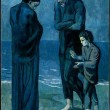Stephen Fry, Job, and the Cross of Jesus
by Bishop Robert Barron
Filed under The Problem of Evil

The British writer, actor, and comedian Stephen Fry is featured in a YouTube video which has gone viral: over 5 million views as of this moment. As you may know, Fry is, like his British counterparts Christopher Hitchens and Richard Dawkins, a fairly ferocious atheist, who has made a name for himself in recent years as a very public debunker of all things religious. In the video in question, he articulates precisely what he would say to God if, upon arriving at the pearly... Read More
Atheism and the Problem of Beauty
by Joe Heschmeyer
Filed under Atheism, The Problem of Evil

A lot has been said about the “problem of pain.” Why, if God is both loving and all-powerful, is there still suffering in the world? The question is a challenge for Christians, as for all theists.Christians have some sense of why a loving God would permit suffering. It's easy enough to see that love is a good (the highest good, even), and that love requires free will. And it's just a small step from there to see how that free will could be used in some dastardly ways. Likewise, it's... Read More
Why God Provides Room to Build a Better World
by Fr. Robert Spitzer
Filed under The Problem of Evil

NOTE: This is the last in our four-part series by philosopher Fr. Robert Spitzer addressing the question, "Why Would God Allow Suffering Caused by Nature?" Instead of focusing on the existence of moral evil, or suffering caused by the free choice of humans, he examines why an apparently good God would create an imperfect world replete with natural disasters, physical disabilities, and unavoidable heartache. Find the other parts of the series here. We now move from an individual... Read More
How an Imperfect World Produces Unconditional Love
by Fr. Robert Spitzer
Filed under The Problem of Evil

NOTE: Today we continue our four-part series by philosopher Fr. Robert Spitzer addressing the question, "Why Would God Allow Suffering Caused by Nature?" Instead of focusing on the existence of moral evil, or suffering caused by the free choice of humans, he examines why an apparently good God would create an imperfect world replete with natural disasters, physical disabilities, and unavoidable heartache. In philosophy, agape is one of the highest forms of love. For our... Read More
Why Would God Allow Suffering Caused by Nature?
by Fr. Robert Spitzer
Filed under The Problem of Evil

NOTE: Today we begin a four-part series by philosopher Fr. Robert Spitzer addressing the question, "Why Would God Allow Suffering Caused by Nature?" Instead of focusing on the existence of moral evil, or suffering caused by the free choice of humans, he examines why an apparently good God would create an imperfect world replete with natural disasters, physical disabilities, and unavoidable heartache. The series will continue on each of the next three Fridays. It is somewhat... Read More
Why Evil and Suffering Don’t Disprove God
by Brandon Vogt
Filed under The Existence of God

NOTE: Today's post is in response to Steven Dillon's post, "Why I Don't Think God Exists." I’d like to begin responding to Steven Dillon’s guest post on God’s existence by complimenting his thoughtful and candid writing. I especially appreciated his opening paragraph where, with great vulnerability, Steven acknowledged that he wished God existed. Some atheists desire just the opposite. The philosopher Thomas Nagel admitted in his book, The Last Word: “I want atheism to... Read More
Why I Don’t Think God Exists
by Steven Dillon
Filed under The Existence of God

NOTE: Today we feature a guest post from Steven Dillon, one of our regular atheist commenters. Be sure to read Brandon Vogt's response, "Why Evil and Suffering Don't Disprove God". I wish that God existed, I genuinely do. His presence would be an invaluable source of hope and strength as well as peace and happiness.1 But, I don’t think he does and that realization is perhaps the greatest of disappointments. Be that as it may, reality is still beautiful and I think we should honor... Read More
Picasso’s Sublime Tragedy
by Dominicans of the Province of St. Joseph
Filed under Art

Pablo Picasso’s Tragedy (1903) depicts three figures huddled on a beach—presumably a family. We see nothing of the ‘tragedy’ itself, however; no trace of specific disaster remains, and we are left to speculate about what series of events may have led to their misfortune. The focus of the painting centers us on the figures themselves. The man and woman are turned inwards in an inherently familial pose, but the distance between them and their downcast eyes reveal their inability... Read More






